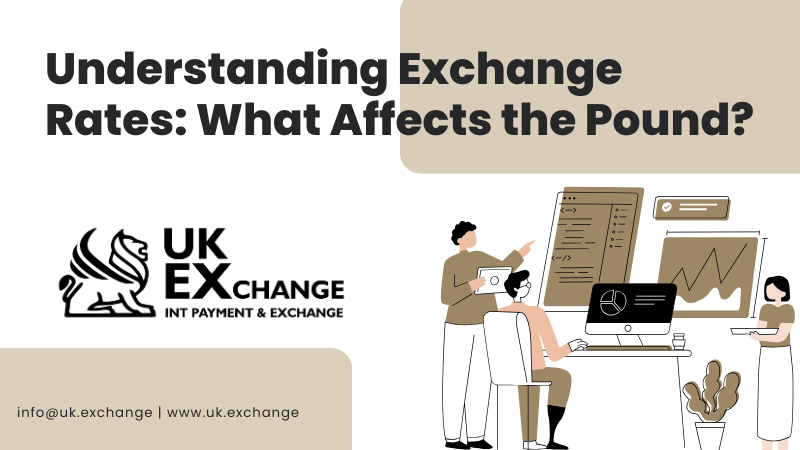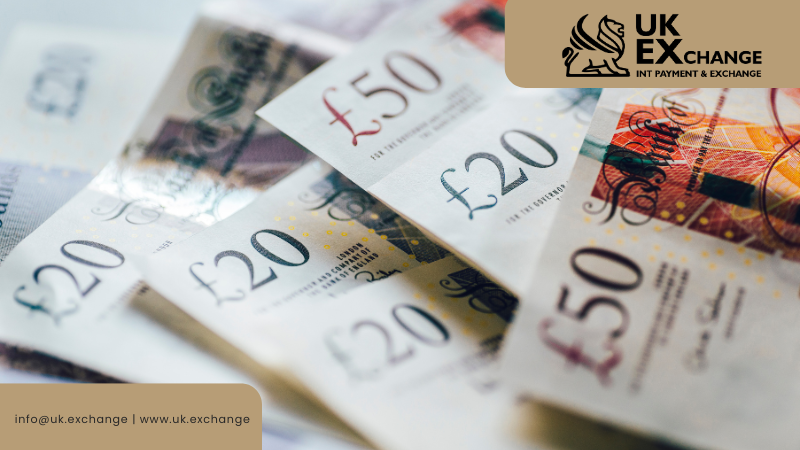
Exchange rate plays a vital role in global trade, travel, and finance, impacting individuals and businesses alike. For the British pound (GBP), one of the world’s most traded currencies, understanding what influences its value is essential. Whether you’re a business owner dealing in international trade, a frequent traveler, or just someone keeping an eye on your savings, knowing the factors behind exchange rate fluctuations can help you make informed decisions.
This blog delves into what exchange rates are, the key factors affecting the pound, and how you can navigate these fluctuations.
What Are Exchange Rates?
An exchange rate is the value of one currency compared to another. For instance, if £1 is equivalent to $1.20, the exchange rate is 1:1.20. Exchange rates determine how much of one currency you’ll get in exchange for another, affecting everything from the price of imported goods to the cost of your holiday abroad.
Exchange rates can be classified into two main types:
- Fixed Exchange Rate: Set and maintained by a country’s government or central bank.
- Floating Exchange Rate: Determined by market forces like supply and demand, which is the case for the British pound.
Key Factors Affecting the Pound

- Economic Indicators
Economic health plays a significant role in determining the pound’s strength. Metrics such as GDP growth, inflation rates, and unemployment levels directly affect exchange rates.
- GDP Growth: A strong economy with robust GDP growth attracts foreign investors, increasing demand for the pound.
- Inflation: Higher inflation often weakens a currency, making imports more expensive.
- Employment Rates: High employment levels indicate a stable economy, strengthening the pound.
For real-time updates on economic indicators, check resources like the UK Office for National Statistics (ONS).
- Interest Rates
The Bank of England sets the base interest rate, influencing the cost of borrowing and saving. Higher interest rates typically attract foreign investment, as investors seek better returns on their funds. This increases demand for the pound, driving up its value.
Conversely, lower interest rates can reduce the pound’s appeal, leading to depreciation.
You can monitor interest rate changes through the Bank of England’s official website.
- Political Stability and Events
Political events and stability significantly impact the pound. The uncertainty surrounding events like elections, referendums, or international relations can lead to market volatility.
For example:
- Brexit: The 2016 Brexit referendum caused significant fluctuations in the pound’s value due to uncertainty about the UK’s economic future.
- Elections: A change in government or policies can influence investor confidence and the pound’s strength.
Staying informed about political events through platforms like BBC News can help you anticipate potential market changes.
- Trade Balance
The UK’s trade balance, which measures the difference between exports and imports, also affects the pound.
- Trade Surplus: When exports exceed imports, it increases demand for the pound, strengthening its value.
- Trade Deficit: When imports exceed exports, it weakens the pound due to reduced demand.
Monitoring trade data through platforms like Trading Economics can provide valuable insights into these trends.
- Global Market Sentiment
The British pound doesn’t operate in isolation; it’s influenced by global market sentiment. Events like the US Federal Reserve’s interest rate decisions or geopolitical tensions in Europe can ripple through global markets, impacting the pound.
For instance:
- A strong US dollar often weakens the pound due to their inverse relationship in forex trading.
- Geopolitical events, such as conflicts, can drive investors toward “safe-haven” currencies like the US dollar, affecting the pound’s demand.
How to Stay Ahead of Exchange Rate Fluctuations
- Monitor Currency Trends
Keep an eye on real-time exchange rates using tools like XE or OANDA. These platforms allow you to track trends and predict optimal times for currency exchange.
- Hedge Against Fluctuations
If you’re a business dealing with international transactions, consider hedging strategies like forward contracts to lock in exchange rates and minimize risks.
- Compare Providers
When exchanging money, shop around for the best rates. Banks, currency exchange bureaus, and online platforms often offer different rates. For instance, UK Exchange provides competitive rates tailored to customer needs, ensuring you get the best value for your money.
- Avoid Dynamic Currency Conversion (DCC)
When making purchases abroad, always pay in the local currency rather than opting for conversion into GBP at the point of sale. DCC often comes with unfavorable rates and hidden fees.

Future Outlook for the Pound
Post-Pandemic Recovery
The UK economy’s recovery from the COVID-19 pandemic plays a crucial role in the pound’s strength. Economic policies, stimulus measures, and public spending will shape its trajectory.
Green Energy Initiatives
The UK’s focus on renewable energy and sustainability may attract foreign investment, strengthening the pound in the long term.
Global Trade Relations
As the UK navigates new trade agreements post-Brexit, the outcomes will significantly impact the pound’s performance in the global market.
Conclusion
Understanding what affects the pound’s value helps you navigate its fluctuations more effectively, whether you’re exchanging money for personal or business reasons. Factors like economic indicators, interest rates, political stability, and global sentiment all play a role in determining the exchange rate.
For individuals and businesses looking to make the most of their currency exchanges, staying informed and using reliable providers is key. Services like UK Exchange offer transparent rates and secure transactions, helping you manage your finances efficiently.
By staying proactive and understanding these dynamics, you can make informed decisions, ensuring your money works harder for you.
Disclaimer
The information provided in this blog is for general informational purposes only and should not be construed as professional financial, legal, or investment advice. While we strive to ensure the accuracy and reliability of the information presented, UK Exchange make no guarantees regarding the completeness, accuracy, or suitability of the content. Readers are encouraged to consult with qualified professionals for advice tailored to their individual circumstances.

